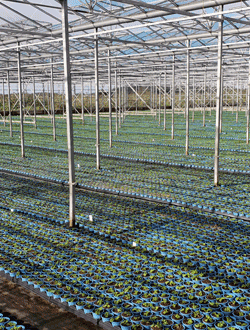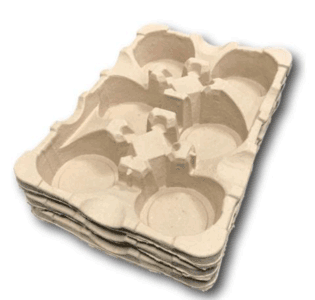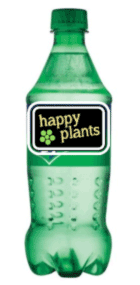Formby growers Porters Fuchsias, supplies of the garden centre Happy Plants brand, are stepping up their recycling programme with a new label for their carbon pigment-free pots and bedding packs made from recycled green plastic drinks bottles
Calls for an industry-wide initiative to replace black plastic pots (which are not widely recycled kerbside) with re-cyclable alternatives have been growing recently. Porters’ decision earlier this year to switch to ‘Poppelman Blue’ pots for most of their Happy Plants ranges put them ahead of the game. They were the first UK nursery to switch and have been seen in more than 80 independent garden centres, as well as at Notcutts, Dobbies, Tillington and Blue Diamond stores.
The response, they say, has been phenomenal, with the groups in particular “scrambling to get their hands on the stock”.

For 2019, the pots will sport a new label (above and cover page) designed to bring the pot’s recyclability to the attention of consumers. As well as the recycling information, the pots are also printed with a barcode, product name and logo, significantly reducing the use of stickers, which can inhibit a pot's recyclability.
The new printed pots will be launched in the New Year, and will include crops of primroses.
 “We believe this pot ticks all the same boxes as the taupe pot currently being discussed- we especially like that the blue pot can be made from 100% recycled post consumer plastics,” they say.
“We believe this pot ticks all the same boxes as the taupe pot currently being discussed- we especially like that the blue pot can be made from 100% recycled post consumer plastics,” they say.
Whilst polypropylene (PP) is considered a desirable material at an industrial recycling level, this has not been the case with kerbside recycling at a consumer level. “More than 90% of pots and bedding packs sold at garden centres end up at the kerbside, so it is essential that we optimise the formats we are using to be as easily recyclable at kerbside as is possible,” the nursery adds.
Because ‘black plastics’ inhibit the near-Infrared sorting equipment used in most kerbside recycling plants, most polypropylene products (especially plant pots) have never been widely recyclable. In turn, this meant a lack of post-consumer material was available to manufacturers, so nobody was making use of the material – and nobody was buying it , so recycling plants had even less incentive to recycle even the non-black PP.
By making their pots carbon pigment-free, and then making use of the resulting post-consumer PP material, Porters have already begun to create a demand, which means the pots will be more valued for recycling and recycling stations have an incentive to process them.
At Porters nursery alone, the initiative has already saved around two million pots from landfill or incineration – for 2019, this should exceed five million.
“We strongly believe that the more nurseries come on board with this incentive, the more likely each pot is to be recycled,” they explain.
Wherever possible, the nursery will again be delivering in Modiform Eco Expert trays (right), which are made from sustainably sourced paper pulp, which can be recycled with newspapers or composted at home.
 Porters say their main change for 2019 is the switch to bedding packs made from recycled translucent green PET bottles (7up, Sprite etc). Again, this material has been chosen for its kerbside recycling potential.
Porters say their main change for 2019 is the switch to bedding packs made from recycled translucent green PET bottles (7up, Sprite etc). Again, this material has been chosen for its kerbside recycling potential.
Plants in PET can very easily be pushed out without the pack cracking/tearing and slicing the customer’s fingers. Tests have shown no negative effect of its translucency on root structure and Porters believe customers will find it interesting to see the roots.
“We also think the material’s ‘past life’ as a drinks bottle will make a fantastic story to tell,” they say.
Products labelled as a 6UP pack are custom-made 16-per-shelf packs (with the same footprint as a D6 pack). The same plastic will be used plastic for summer 6x9cm carry packs. Options for PET trays are being explored, along with compostable materials for some plant labels.
“We are very happy to see so many other customers following suit- the more companies involved, the more the recycling companies will be obliged to step up and take note,” Natalie Porter told GTN Xtra.